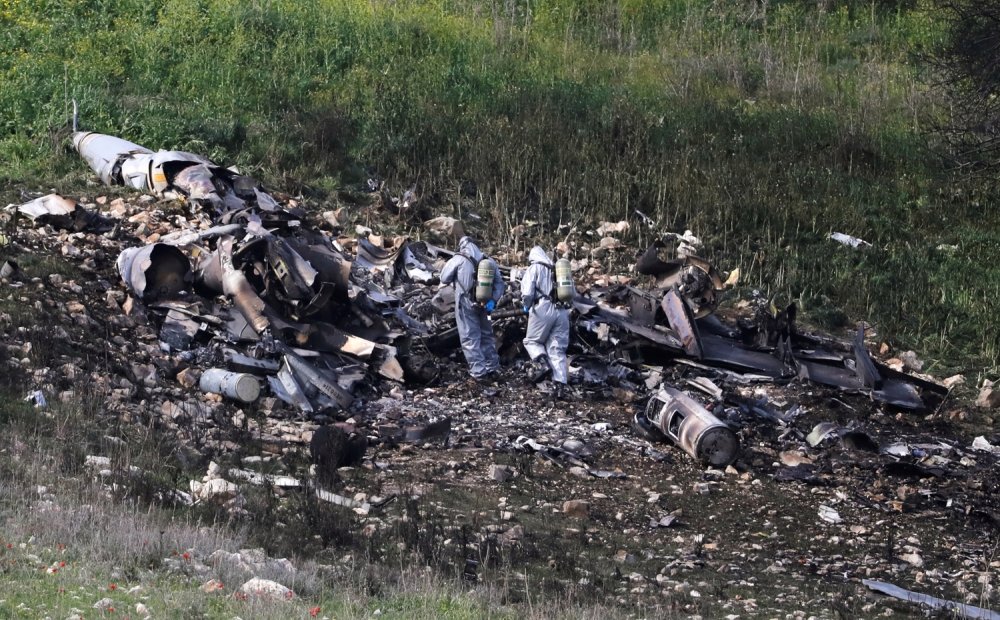Are Iran and Israel Going to War in Syria and Lebanon?

Last week, tensions exploded along the Israeli-Syrian border in a sequence of historic firsts: an Iranian drone penetrated Israeli airspace; Israel attacked Iranian-manned sites in Syria; Syria shot down an Israeli fighter jet for the first time since 1982; and Israel conducted intensive airstrikes against Syrian air defenses.
Are these developments a one-off headline or do they reflect new trend lines that will continue to generate tensions and perhaps a major Israeli-Iranian conflict or a full-scale confrontation between Israel, Hezbollah, and Syria along an expanded Lebanese front?
In this Ground Truth Briefing, three veteran analysts of Israel, Syria, and Iran addressed these and related issues.
Selected Quotes
Jane Harman
“Many people at the [Munich Security] Conference who are thinking about what are the most unstable parts of the world of course start with North Korea, but it takes about ten seconds to move to the Middle East and to think about the unintended consequences of all of the rivalries and enmities that are still raging there – and that is why this topic is so timely.”
Aaron David Miller
“The underlying causes for this escalation have not been remedied or resolved. [They include:] one, Iran’s desire, presumably, to establish some sort of dominant military presence in Syria and extend the Lebanese front; Israel’s determination to constrain this trend; Assad’s rising self-confidence, as he asserts himself with Iranian and Russian help to regain territory; and finally, what appears to be the absence of a regularity mechanism in Syria, which has become a sort of free-fire zone for a number of external powers – the Turks; the Russians; Iranians; Israelis, to a lesser extent, so far, at least; and, of course, for the Americans.”
Major General Amos Yadlin
“The world is basically turning its head to the other side, ignoring the fact that there is a massacre that’s going for seven years in Syria. When the airplanes are falling, when some Iranians are attack[ing], we are all speaking, but the fact that the Syrian people are paying such a high price is not enough, I think, in the focus.”
“What I’m seeing in the last month is not a conflict that’s towards the end, but conflict… more dangerous than I saw in the last seven years… In the last two months, state and superpower are fighting directly in Syria.”
“When [Israel and Iran] are clashing, this is a recipe for escalation, and this is basically what we saw two weekends ago… And then came the telephone from President Putin. President Putin has a unique position in the Middle East, not only in Syria; he is the only one who can pick [up] the phone to everybody — to each pair of enemies. The Saudis and the Iranians, the Israelis and the Palestinians, the Kurds and the Turks. In this case, the Israelis and the Syrians and the Iranians — so this time, it was basically contained. The confrontation between Iran and Israel — I am not sure if it is going to be contained next time.”
Suzanne Maloney
“What’s not predictable, of course, is what the next phase will be. I think if anyone is watching closely, it is the Iranians, because they have the most to gain — but they also have the most to lose.”
“I think what we’ve seen in the course of recent weeks is an attempt by the Iranians to both consolidate their gains in Syria, but also to test the limits of their room to maneuver. They’ve been looking, I think, to establish exactly where the Israeli redlines are and to see exactly how far they can test the tolerance of the Israelis for their presence in Syria.”
“One point on which the Iranians and Israelis agree is that the Iranians essentially want payback. They’ve invested a lot in Syria… What you hear from Iranian security-force leadership is an expectation that Iran will have the paramount position in any kind of reconstruction of Syria, but also simply in just looting Syria for whatever Iran can get in terms of economic benefits... I think there’s almost no prospect that they’re going to leave the battlefield open for other forces who would have the advantage.”
Robert Malley
“Syria has really now become the microcosm of broader regional and international dynamics and trends… It has now become a world-class importer of instability and intervention, and that’s done by outside actors in order to regulate their own regional and international competition.”
“The [Syrian] regime may be winning the battle at an excruciatingly high human cost, but Syria’s losing the war — not just people, but Syrian sovereignty. It is less sovereign than at any time in terms of its territory and airspace and what is happening.”
“I think it’s both justified and telling that the U.S. perspective comes last, because it has not been an essential actor in the drama that unfolded two weeks ago, both because it probably doesn’t have the capacity — it doesn’t have the kind of leverage in Syria… and it probably doesn’t even have the will. My sense of the Trump administration is that it doesn’t want to be in a position of deescalating… It is content in allowing Israel to take the lead.”
Speakers

Introduction

Moderator

Hosted By

Middle East Program
The Wilson Center’s Middle East Program serves as a crucial resource for the policymaking community and beyond, providing analyses and research that helps inform US foreign policymaking, stimulates public debate, and expands knowledge about issues in the wider Middle East and North Africa (MENA) region. Read more
